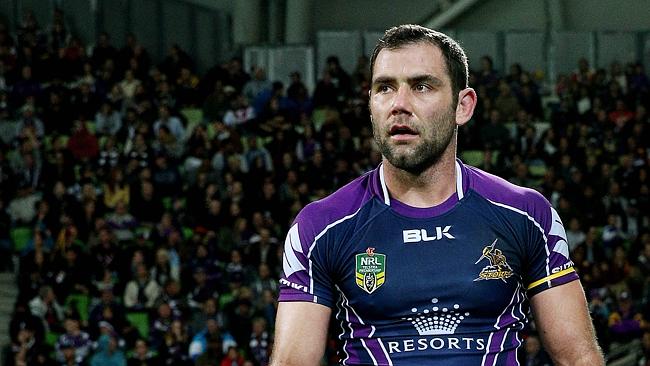
Once upon a time, 60 Minutes had credibility. It was the Nine segment that informed the public in homes across Australia, delivering unbiased reporting to a receptive community. Unfortunately, that time has well and truly passed. In 2015, the segment is often a simple, hour-long character assassination, featuring the target(s) of the week. In last night’s case, that target was Cameron Smith, and the witch hunt was as unforgiving as it’s ever been.
Last year, while playing for Newcastle against the Storm, Alex McKinnon was the victim of an illegal tackle that left him paralysed. One could argue that in the moments following McKinnon’s injury – at which point no player on the field understood the severity of what had transpired seconds earlier – Smith’s behaviour was beneath that of an Australian captain. But his actions on the field, in the heat of the moment, pale in comparison to the premeditated, emotional manipulation of the 60 Minutes team.
During last night’s show, Liz Hayes sat down with McKinnon, a man who’s only recently come to terms with the fact he is now a quadriplegic. She played back the moment his life changed forever, marking the first time the ex-NRL star had viewed the footage since the incident. The two experienced, once again, the horrifying tackle, as well as the sight of Smith trying to squeeze out of a penalty in the moments that followed.
The focus then shifted almost entirely to Smith’s actions. Rather than telling an inspiring story of McKinnon’s recovery, 60 Minutes used the pain of a life changed to paint a villain, portraying a well respected rugby league captain in an overtly negative light, and quite obviously skewing the entire program to support their intentions.
To me – and I’m sure many others – it was obvious that 60 Minutes had morphed the human beings they were covering into pawns in a rating’s war. The pain of watching the media assassination climaxed at the sight of McKinnon’s father being pushed into saying what Cameron Smith did was ‘unforgivable’. That very moment was enough for most moral compasses to spin entirely off their axis.
Unsurprisingly, there was no mention of the good deeds Smith did (he was involved in the Rise For Alex round, that raised over $1 million last year) in the wake of McKinnon’s tragedy, likely because kindness and unison don’t play a role in making a dramatic saga out of one’s misfortune.
Such information would have taken away from the bullshit script writing that 60 Minutes impose on absolutely everything they cover, pandering to whoever-the-fuck finds it fitting to interject “saved by love” into what felt like nothing more than an elaborate way of dirtying a household name in Australian rugby league.
This segment, like so many others 60 Minutes segments before it, was delivered with a clear and defined intention: to exploit the emotional scars of a family in grieving and paint a person for the public to hate, so as to generate a story and garner enough press to keep their disorientated garbage afloat.
This is not news, nor is it current affairs. At best, this is poorly executed reality TV.
At worst, it’s the start of Australian media’s downfall.
____
Words by Patrick Cullen. Photo by Herald Sun.
_________
If you have a story that you'd like to share, please submit it here.




